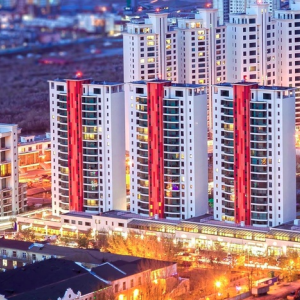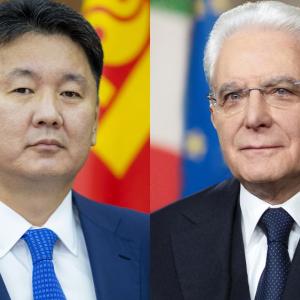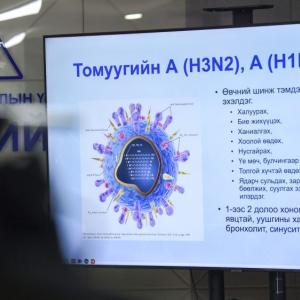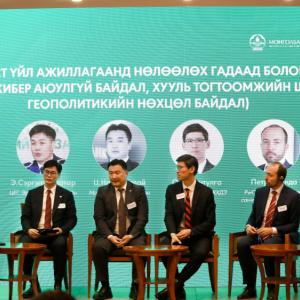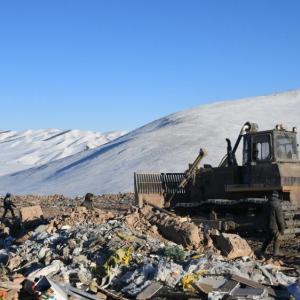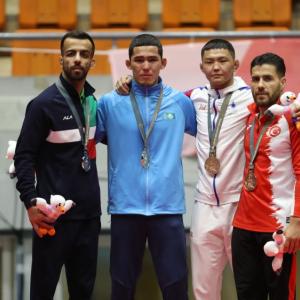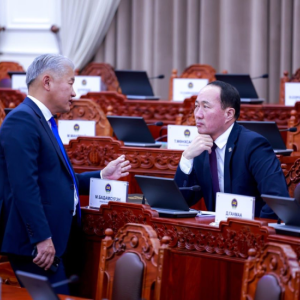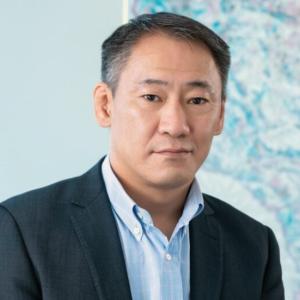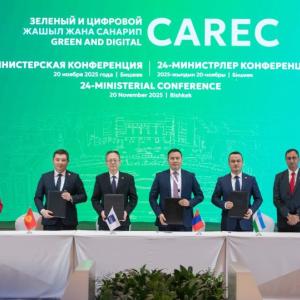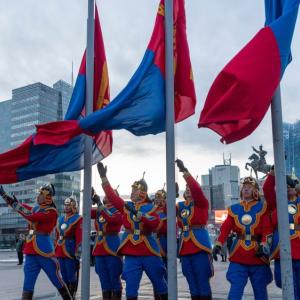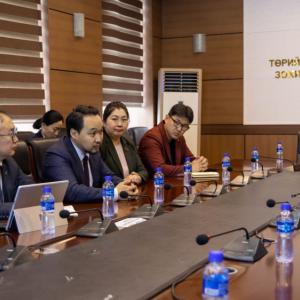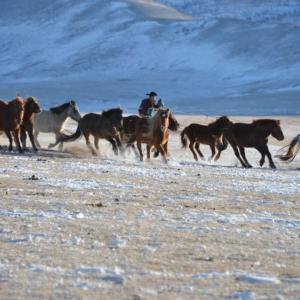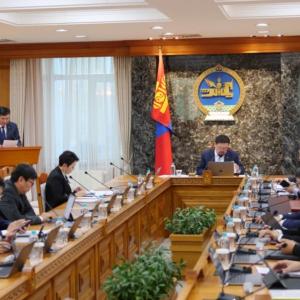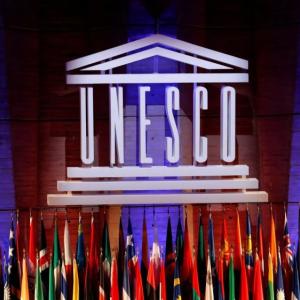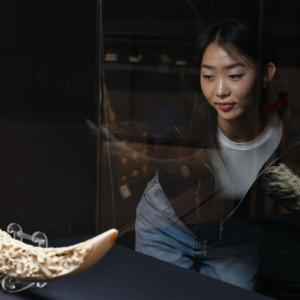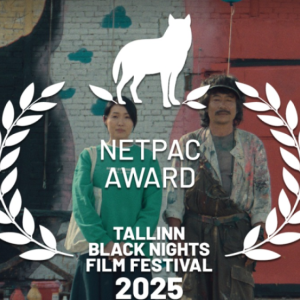Ambassador Udval: Mongolia and Germany Enjoy Thriving Relations
To the 50th Anniversary of Establishment of diplomatic relations between Mongolia and Germany
Ulaanbaatar, February 5, 2024 /MONTSAME/. At the invitation of President of Mongolia Khurelsukh Ukhnaa, the President of Federal Republic of Germany Frank-Walter Steinmeier will pay a State Visit to Mongolia. In anticipation of the State Visit, MONTSAME, Mongolian National News Agency, interviewed Ambassador Extraordinary and Plenipotentiary Mr. Udval Luvsanjamts about the history of friendly relations and cooperation between the two countries. He was the Ambassador Extraordinary and Plenipotentiary of Mongolia to Germany in 1995-1999.
- This year marks the 50th anniversary of the
establishment of diplomatic relations between Mongolia and Germany. What period
would you highlight in the evolution of relations between the two countries?
- To answer this question, I have to mention some
historical events of the past. Europeans, especially Germans, first learned
about Mongols in the 13th century. As for the relatively new era, it is
necessary to recall the efforts made by the Bogd Khanate to have its
independence recognized by major powers of the world. After the 1921 People's
Revolution, although no official relations were established, the Germans were
interested in Mongolia, and the
beginning of trade and commerce was established at this time.
German diplomats in Moscow and Beijing came to Mongolia and
met with representatives of the Mongolian People's Government. In addition,
there is a fact that in 1922-1923, some German firms operated in Mongolia where
the first German specialists worked, and they had a good reputation among the Mongolian
people. Germany and France were the first countries among Western countries to which
Mongolian students were sent for
education. Well-known intellectuals including D. Natsagdorj, founder of the modern
Mongolian literature, writers D. Namdag, N. Navaaan-Yunden, artist L.
Namkhaitseren, and geologist J. Dugersuren were among the 40 people who studied
in Germany at that time. After World War II, in the late 1940s and early 1950s,
when democratic countries began to recognize Mongolia, on April 12, 1950, our
country established diplomatic relations with the Democratic Republic of
Germany and successfully cooperated in all fields. Diplomatic relations with
the Federal Republic of Germany (FRG) were established on January 31, 1974,
exactly 50 years ago. At that time, FRG was the 62nd country to establish
diplomatic relations with our country. This is what I can say to the question
in short.
- You worked in the diplomatic service for 40
years. When holding the office of ambassador, who fully represents the country in
foreign countries what did you aim for and focus on?

- When East and West Germany reunited in 1990, Mongolia
opened its Embassy in Bonn, the capital of Federal Germany then, and Mr.
Tsolmon was appointed as the Ambassador. At that time, I had been working as a Counselor
at the Embassy in Berlin since 1985. The Embassy where I worked was reorganized
as the Branch of the Embassy in Bonn, and I was appointed as the Head of the Branch.
Earlier, the Embassy in Warsaw Poland had been in charge of
Germany since the establishment of diplomatic relations with FRG. At that time,
I was appointed as the first diplomatic officer when a new position was created
at the Embassy in Warsaw in charge of relations with the Federal Republic of
Germany. It was 1975. So I was in charge of Mongolian-German relations for
about 40 years - in the Ministry of Foreign Affairs, in the Embassies in Berlin
and Bonn, and a non-governmental organization called the Mongolian-German
Conference. I am happy that I served from attaché to ambassador, taking
responsibility for Mongolian-German relations. I worked as Ambassador
Extraordinary and Plenipotentiary of Mongolia to the Federal Republic of Germany
from 1995 to 1999 and now I am the General Secretary of the Mongolian-German
Conference, an elected position I have been holding for 25 years.
What was your first impression of Germany?
- In the beginning, it was not easy to live and work in a
foreign country, among people with different cultures and customs. However, when
you make every endeavor not to lose the trust of the people of your home
country and to fulfill tasks the government gave, you will naturally get used
to it.
Upon being appointed as Ambassador, my first goal was to
raise the level of political relations. As a result, the Heads of State of
Mongolia and Germany made a mutual visit for the first time. In addition, fruitful
relations at the level of Parliament, Foreign Affairs, Finance, and other ministries
were intensified. I also focused on strengthening the legal foundations of
relations.
The document called “Joint Statement on the basis of relations between the Federal Republic of Germany and Mongolia” was first established. This was a big achievement.
Many other economic, cultural, and education documents were established and
implemented. We also managed to resolve the debts of Mongolia created during
the former GDR era and related documents were signed. Regarding the development
of economic cooperation, Mongolia was at the top in terms of per capita aid
provided by Germany to developing countries.
When I was appointed as Ambassador, the economic
cooperation between Mongolia and Germany totaled 28 million Deutsche Marks. But
at the time when I left office in 1999, it had grown to 70 million Deutsche
marks, and it changed from aid to project implementation. I also took part in the
initiation of attracting investors to Mongolia and organizing investor meetings
in major German cities. Namely, meetings were held in six cities: Berlin,
Munich, Cologne, Stuttgart, Leipzig, and Dusseldorf.
The book "Investors Directory" was developed for
foreign investors and published in German for the first time. I think this book
was useful for German investors. In addition, the first air transport agreement
was signed with FRG. Consequently, MIAT, Mongolian Airlines, began to conduct regular
flights to Berlin and Frankfurt, opening the largest gateway to Europe.
Also, the Prime Ministers of the two countries personally
participated in the opening of the major exhibition on "Chinggis Khan and
his Successors" in Bonn and Munich. Ulaanbaatar Culture Days were first
held in Bonn, and later Bonn Culture Days took place in Ulaanbaatar. I managed
to implement multiple works. These are some of the works I accomplished. Subsequently,
the relations between the two countries continue to progress and flourish in
most fields today.
- What are the special characteristics of
diplomatic relations between our two countries?
- The characteristic of the relationship between the two countries is a stable attested relationship. Germany is our leading partner in Europe and our reliable third neighbor. Though our country established diplomatic relations with FRG in 1974, Mongolia opened its permanent embassy in Germany in 1990. After establishing our embassy, we set a major goal, which was to raise the relations between the two countries to a higher level. High-level visits give a big impetus to the overall relationship. That is why, when the first President of Mongolia, Ochirbat Punsalmaa made a State Visit to Western European countries in 1995, Germany was the first country he visited as the leading partner in Europe. During this visit, the parties signed the Joint Statement on the basis of relations between the Federal Republic of Germany and Mongolia. This document was a fundamental document that defined the basic principles and priorities of relations between the two countries.
In 1998, among heads of state in Western countries, President
of the Federal Republic of Germany Roman Herzog made an official visit to
Mongolia first, which was a big support to the young democratic Mongolia.
At that time, Mr. Roman Herzog described the
Mongolian-German relationship as an "especially attested relationship”.
From here, the cooperation progressed to a new level, and later the
Comprehensive Partnership was established. From a young age, Mr. Herzog was
interested in the history of the Eastern world and had a very good impression
of our country after reading "The Secret History of the Mongols".
During his visit to Mongolia, Mr. Herzog visited the ancient capital Kharkhorin
and signed a document on the initiation of joint archaeological excavations of
the two countries at the Erdenezuu Monastery under the auspices of the
Presidents of the two countries. Since then, cooperation in the field of
archeology between our two countries has been progressing.
During my office as Ambassador, I initiated the restoration
of archaeological finds in cooperation with Germany. The German side restored a
birch bark manuscript discovered in the Khar Bukh Balgash and just before he
visited Mongolia, President Roman Herzog personally visited an exhibition at
the University of Bonn where the restored finding was displayed.
- You mentioned our active collaboration with
Germany in archaeology, and it's fascinating to reflect on the historical ties
between Mongolia and Germany. A century ago, Mongolia looked to Germany for the
training of its first intellectuals. Interestingly, this partnership has
evolved, and today, we observe a growing educational alliance between the two
nations. The increasing number of young individuals proficient in German and
eager to learn the language is a testament to the expanding cooperation in
education.
- During the unification of East and West Germany,
approximately 500 students from our Technical and Vocational School (now the
Vocational Training Center) were studying in Democratic Germany. West Germany
implemented a commendable program, supporting these students until their
graduation. What began in East Germany persisted through the reunification,
resulting in more than 30,000 German - speaking individuals in Mongolia during
the German Democratic Republic period. Considering Mongolia's population was less
than three million at the time, this was a substantial figure. Studies indicate
that over 40,000 individuals have received education in Germany so far, underscoring
the significant contribution Germans have made to our education landscape. Nowadays,
more and more people go to Germany seeking degrees.
In the past, university students frequently attended
vocational training in Germany. Currently, a branch of the Goethe Institute of
Germany operates in Mongolia, offering German language training in
universities, colleges, and both public and private general education schools.
Additionally, a joint Mongolian-German university, specializing in mining and
minerals, successfully operates in Nalaikh district of the capital of Mongolia.
- The Federal President of Germany is going to pay
a State Visit to our country. As someone who dedicated his youth to fostering
Mongolia-Germany relations, how do you envision the benefits of this visit?
What will be its significance in politics and other fields?
- There is an unwritten law that every government visit has
great importance and benefits. During President Ochirbat Punsalmaa's visit, the Joint Statement on the basis of relations between the Federal Republic of Germany and Mongolia was
signed. Subsequently, in 2008, when Federal President of Germany Horst Köhler
visited Mongolia, he signed the document on Comprehensive Partnership. This
marked the beginning of many years of comprehensive partnership between the two
countries. Hence, I believe it is an opportune moment to elevate it to the
level of a strategic partnership. The first talks about upgrading the
partnership to this level began in 2015, and we cannot deny that these
discussions will likely materialize during the State Visit.
Federal President of Germany Frank-Walter Steinmeier
visited Mongolia when he was the Minister of Foreign Affairs. Therefore, I
understand that the proposal and initiative to visit Mongolia started from the
German side.
Beyond doubt, this visit serves as a testament to our
country's independent, wise, and stable policy. It is a concrete illustration
of the success of Mongolia's third neighbor policy. Additionally, it mirrors
the friendly and trusting attitude of our primary European partner.
- What, in your view, is a sector where
cooperation needs improvement to foster stronger relations between our two
countries?
- When it comes to political, cultural, and humanitarian
ties, Mongolia and Germany enjoy a positive rapport with promising prospects
for further development. However, in comparison, I perceive the economy, trade,
and investment sectors as somewhat underdeveloped and weak. This is a point I
frequently emphasize during discussions with my German friends. Personally, I'm
optimistic that the upcoming Visit will catalyze progress in these areas.
Considering Germany's status as one of the world's leading
exporters, there's significant potential for mutual benefit if we enhance our
collaboration in the economic and trade domains. Our focus should be on not
only benefiting from Germany but also on boosting our own exports. Expanding
our business relationship is essential.
Furthermore, there's an untapped opportunity in the tourism
industry, particularly thanks to the existence of direct flights. Streamlining
visa procedures and adopting a pricing policy for plane tickets could lead to a
substantial increase in European tourists interested in visiting Mongolia via
Germany, and beyond. Hence, I believe there should be more extensive
discussions and talks in this field.

- What is your most memorable moment in Germany?
- The fondest memories often trace back to our youth, and
for me, those years as a diplomat in East Germany shine the brightest. Later,
during my tenure as Ambassador in Bonn, my children grew up, attending school,
and my recollections are dominated by the times I engaged with representatives
of the German government. It's the moments tied to official duties that stand
out vividly.
- What influenced you to become a diplomat?
- I graduated from the Moscow State Institute of
International Relations in 1967-1972, specializing in German-speaking
countries. Back then, the Ministry of Foreign Affairs had a rigorous selection
process for its personnel, specializing them in specific fields and hiring them
upon graduation.
When I finished secondary school, my dream was to become a
writer and journalist. My passion for literature began early – I published my
first poem in the newspaper of my aimag in the sixth grade, and in the ninth
grade, I wrote and staged a children's play at the cultural center of my aimag.
The year I graduated from secondary school, I chose the
Mongolian language and literature class because I was not accepted into the
journalism class of the National University of Mongolia. In my third year, an
employee from the Ministry of Foreign Affairs approached me, inviting me to
take the exam for admission to the Moscow State Institute of International
Relations.
That is how I changed my dream of becoming a journalist and
writer and started to study as a diplomat. I do not regret it at all. Thanks to
this rewarding profession, I served as a diplomat from 1972 to 2009,
contributing significantly to strengthening my country's diplomatic service. A
significant part of these years was dedicated to activities related to
Mongolia-Germany relations.
- You mentioned your childhood dream of
becoming a writer and journalist, expressing your fondness for writing poetry.
Have you ever tried writing poetry in German?
- When I found myself in a foreign land, the nostalgia for
my home country and old friends often overwhelmed me. During those times, I
used to write poems as a way to refresh and comfort myself. Most of the poems
in my composition "An Offering to My Land " and my literature
collection titled "Soul Portrait" vividly depict my yearning for my
homeland. However, I never ventured into writing and publishing poems in
German.
- Foreigners say that learning Mongolian is
difficult. Is it difficult to learn German?
- I believe Mongolians possess a natural aptitude for
quickly grasping and adapting to new things, including learning foreign
languages. Given the richness of Mongolian phonetics and pronunciation, picking
up a foreign language does not appear to be a significant hurdle. However, it
is worth noting that while there is a general talent for language learning,
patience can sometimes be lacking, and consistent effort is crucial for
deepening knowledge and mastery.
- What specific qualities do you admire about
Germany and its people?
- Well, Germans are inherently known for their strong sense
of responsibility and principles in everything they do. Punctuality, in
particular, is a notable trait – fulfilling obligations on time is a defining
quality. Their ability to create a beautiful living environment is also quite
remarkable.
Mongolians who have completed their studies in Germany tend
to absorb these admirable qualities, becoming highly businesslike, faithful to
their duties, disciplined, and driven to achieve their goals. It's quite
evident when interacting with individuals who've studied in Germany. In
essence, there is much to gain from Germans’ exceptional sense of
responsibility, both in their personal lives and professional endeavors.
- Thank you for taking the time to talk with MONTSAME.
- Thank you. Federal President of Germany Mr. Frank-Walter
Steinmeier has officially announced his Visit to Mongolia. This Visit of the Head
of State of Germany, our trusted and reliable friend and main partner in
Europe, holds significant importance. I hope this Visit strengthens political,
cultural, educational, and humanitarian ties between our countries.
Furthermore, I wish for productive business dialogues that will serve as a
crucial stimulus for economic and investment cooperation, leading to tangible
results.
 Ulaanbaatar
Ulaanbaatar
























